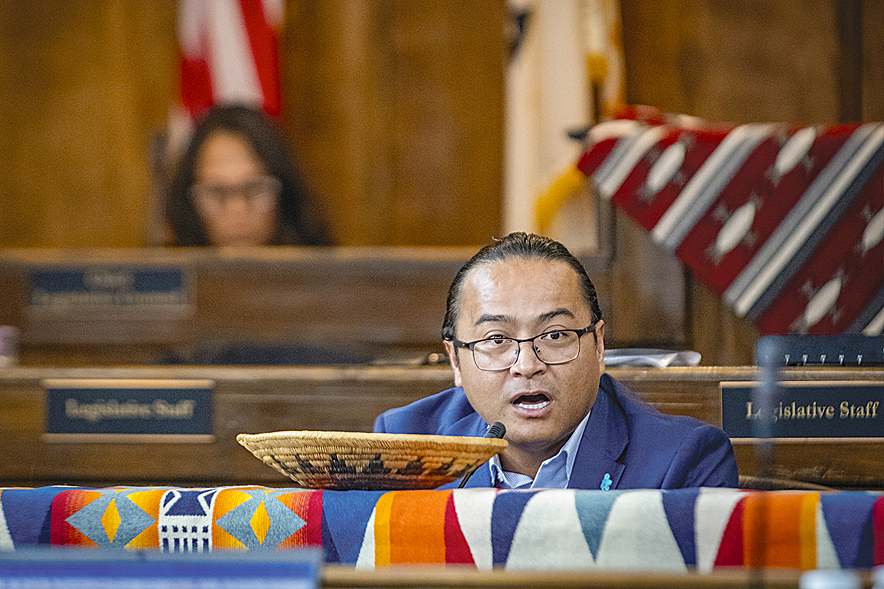
Nygren: I’m a little disappointed: Council questions Nygren during Winter Session

Special to the Times | Reginald Chee
President Buu Nygren delivers the State of the Navajo Nation Address on the first day of the Winter Session inside the Nahat’á Bá Hooghan in Window Rock Jan. 22.
WINDOW ROCK – As the clock ticked, the president did not waste a single breath addressing the Nation, only to be questioned by the Council for hours.
On Jan. 22, President Buu Nygren arrived at a packed and bundled Council Chamber a few minutes early to deliver his speech in 20 minutes, but while he talked, questions were raised among the Council.
When Nygren began his address, he was turned around to see former Delegate Seth Damon as speaker pro tem instead of Speaker Crystalyne Curley, who allowed him to preside over the Council one last time before leaving office.
Initially, Vice President Richelle Montoya did not walk in with Nygren but made it to the Council Chamber ahead of Nygren’s speech.
Out of respect, Damon asked the delegates to allow Montoya five minutes to speak.
Curley motioned to give Montoya 10 minutes, to which Council Delegate George Tolth objected.
Tolth’s objection began with several hours of long back-and-forth questions and answers between the delegates and Nygren and Montoya.
Tolth called out the Nygren Administration’s lack of involvement with the Eastern Agency’s chapters. He was assured that moving forward, Nygren would make it a point to get out to Eastern Navajo more and help with the conflicts in the chapter houses.
Commitment to Diné
However, it wasn’t just Tolth who questioned Nygren and Montoya’s commitment to Diné.
Council Delegate Helena Nez-Begay raised concerns about the tribe’s Western Navajo employees who need to be in Window Rock for work but are penalized by work policies for being late or not showing up because of weather conditions.
Not only were older Diné a concern, but Nez-Begay wanted to ask for funding to fix Head Start in the communities she represents and across the Nation. The Navajo college and high school students who go off the Nation for school, she said, also need help.
“They’re not here to speak for themselves,” said Nez-Begay. “But these are concerns brought to me.”
Concerns by Council delegates ranged from his administration’s involvement with Missing and Murdered Indigenous Relatives, his administration’s high staff turnover rate with directors, environmental issues like uranium mining, and policies and regulations to organizing ARPA funding.
“I’m very disheartened to see and hear and learn of several of your director’s management styles,” said Delegate Brenda Jesus. “We often speak to retain human capital, but there has been a high turnover rate, like working in a toxic workplace where staff are fearing in keeping their job when a supervisor does display inappropriate behavior that should not be acceptable.”
Jesus emphasized the importance of holding individuals accountable for their actions and pushing the Nygren Administration to have an open mind regarding ideas and young Diné people – who have an education and are qualified to fill specific roles – returning home.
Delegates Andy Nez and Shaandiin Parrish reserved their time to continue asking questions until they got a definitive answer from Nygren.
President answers questions
Nygren also stated several times he was disappointed with the lack of involvement his directors were giving, as reported by the delegates.
“Everybody I’ve let go of, I’ll be honest, I’m the one that holds onto them for a month or two longer than they should have been around,” said Nygren.
Nygren often felt he needed to give specific individuals a chance and, out of respect, let the individuals stay just a little longer.
To combat directors who aren’t willing to put Diné first, Nygren said if he hears several complaints, those people won’t be working for him for very long, which was also a reason for the high turnover rate.
Delegate Nathan Notah told Nygren the Council shouldn’t be having to ask rounds of questions. He said he hopes there’s more action behind Nygren’s “State of the Navajo Nation Address by spring session.”
President’s report
At the beginning of Nygren’s address, he congratulated Damon on his new position as New Mexico’s deputy secretary of Indian Affairs. Then he recognized Code Talker John Kinsel Sr.’s 107th birthday.
Nygren shared the Navajo Department of Transportation’s accomplishment of assisting 112 residents with snow removal, equating to 3,000 miles of snow, over the last month.
Because of weather conditions, many government employees, like first responders, had to work overtime, and the Nygren Administration approved $30,000 in overtime pay.
Nygren recounted that he and first lady Jasmine Blackwater-Nygren visited several communities where the president found his toes and ears getting cold and that he was even hungry. He pictured older Diné who could feel the same way and need assistance.
Nygren commended the work of the Navajo Department of Health and its collaboration with community health representatives, or CHR, and other programs that helped Diné most in need.
Nygren then called on the Indian Health Services and the Bureau of Indian Affairs to help assist the community since they can do so.
Next was Nygren’s push to raise the minimum wage of the Navajo Nation, not only to government workers but everyone on the reservation, since Arizona raised its minimum wage to $14.35 an hour. Flagstaff is currently at $17.40.
A year ago, when Nygren stepped into office, one of his priorities was lifting the mask mandate, which, a year later, Nygren believes improved the economy of the Nation. He pointed to the increase in taxes collected this past year as proof.
In total, taxes collected added up to $142 million. Nygren added that he looks forward to new ways of collecting taxes, a part of the tribe’s sovereignty.
Nygren then moved on to his administration’s actions to assist veterans by getting them paid and getting more VA clinics and health services to the reservation for Navajos and non-Native veterans.
Regarding ARPA funding, Nygren said that he wants to ensure no surplus by the end of organizing where the money goes. He wants to make sure every cent is used for Diné.
By 2030, Nygren hopes to have upgraded cell service to 5G installed at all the chapter houses.
Nygren reported that the Department of Corrections purchased two mobile detention centers in Fort Defiance and Shiprock through $3.6 million in ARPA funds.
Nygren has worked to secure millions of dollars to help small businesses.
The Chinle Sober Living Center, which was a response to the fraudulent rehab home scams that targeted Native American people, has opened. It’s a way to help drive Operation Rainbow Bridge forward.
For the youth, Nygren shared that the Shiprock Navajo Regional Behavioral Health Center Youth Residential Treatment Center will reopen. He hopes to open similar centers for youth in both Tuba City and Crownpoint.
Another huge triumph for Nygren this past year was purchasing Gouldings, buying back Navajo history, and he aims to continue keeping it alive for local job and revenue purposes.
Nygren also ensured that Congress provides money to assist Diné homeowners who experienced hardship in paying for their homes during the pandemic. Nygren’s administration and partnering organization, Native Community Capital, will continue to accept applicants and support Diné.
Nygren mentioned last month’s oil spill in Shiprock and thanked everyone for not pointing fingers. Instead, he noted how the different entities got to work on site within an hour of the spill.
To end the State of the Navajo Nation Address, Nygren invited Curley and Chief Justice JoAnn Jayne to discuss complaints about the criminal justice system.
The full recording of the Winter Session, day one, is on the Navajo Nation Council’s YouTube and is made public via Zoom and YouTube.
Nygren’s address celebrated accomplishments from different departments in his administration, but to the Council, more actions are needed to be there for Diné.
“I’m a little disappointed. That’s all I can say,” said Nygren. “I think it’s just going to be sitting down and recapping with my team.
“I just wanted to express my disappointment, and we will work on being better and hopefully (by) spring,” he added. “As Honorable Notah mentioned, a lot of these questions are taken care of by then.”







 Highway 264,
Highway 264, I-40, WB @ Winslow
I-40, WB @ Winslow